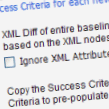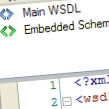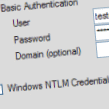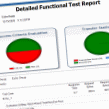API Performance Testing

API Performance Testing
Virtual Concurrent Clients | Throughput Statistics | Latency Measurements | Semantic Error Validation
API Performance Testing

Throughput and Latency
Create performance loading profiles with concurrency and distributed loading agents for high volume and high transaction per second (TPS) loading of API endpoints.

Success Criteria Rules
Validating API behavior is simplified by creating expected behavior rules using the success criteria rule framework. Quickly enable functional and performance testing to detect and report API expected behavior.

Virtual Users
Virtual users provide real-time dynamic loading clients which simultaneously load the API and capture statistics for throughput, latency, and TPS. Scenarios include ramp-up, ramp-down, and weighted scenarios.

Regression Testing
Embedded behavior variance engine provides XDiff technology to automatically detect behavior variances and regression between API tests and API versions. Capture API baseline behavior and then run regression tests to detect and report any regression of functionality or expected behavior.

PKI and Security
Built-in PKI engine for TLS, Digital Signature generation, and Encryption. Supports direct access to X.509 keys from Windows, Java keystore and dynamic SmartCard readers. Also support dynamic PKI for run-time specified PKI when API tests move from one environment to another.

Automatic Message Generation
OpenAPI and WSDL schema parsing with automatic JSON and XML generation. Enables simplified message generation by providing schema from OpenAPI, WSDL or stand-alone XSD schema. Messages can then be created via graphical form editor and resulting messages automatically created.

MFA and SSO
Protocol identity generation for Basic Auth, SSL X509 Auth, and NTLM. Message based identity generation for SAML, OAuth, Amazon AWSv4, X509, and Kerberos Identity Tokens

Test Reports
Detailed reports for results based on type of test performed including Functional, Performance, Compliance, and Vulnerability reports. Export formats XML, DOC, XLS, PDF, RTF, and RPT.

Test Variables
Variable substitution in message headers, message body, tasks, identity credentials. Dynamic X.509 aliases for PKI. Runtime variable, global variables, context functions, and automation variables.